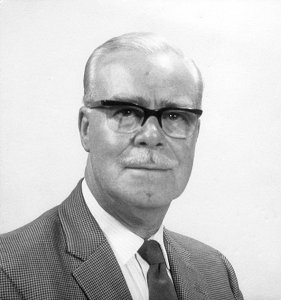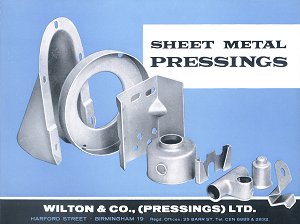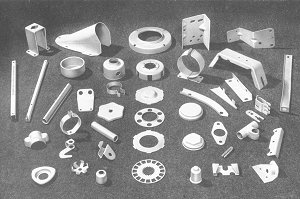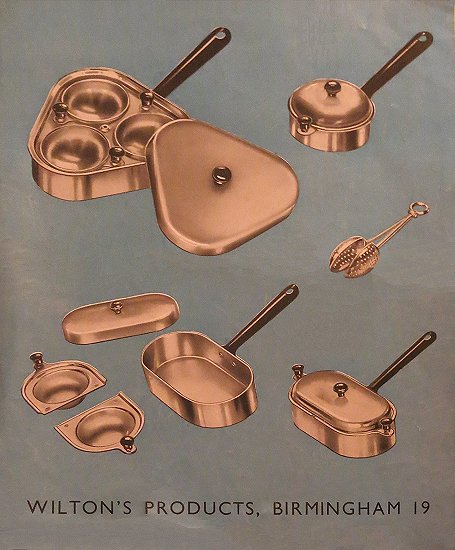My time at the company
|
I joined the company in 1955 after serving an
apprenticeship in the Press Tool Design Office of Nuffield Metal
Products. My first position was to establish a Tool Design Office and to
run the toolroom. In December 1960 I was appointed to the Board as the
Works Director.
The factory was expanded again in 1963 by building over
the area formally occupied by the two retail shops. This enabled a
modern Metal Shearing Department and steel stores to be constructed.
On the 20th July 1960 my mother, Mabel Rollings, died
suddenly after a short illness. She had served as a Director of the
company for 25 years and had been Company Secretary since 1968. This
left a gap which was hard to fill. My wife, Sylvia Rollings and Mr Jeff
Gillett, our former accountant, took over her post and became Directors
of the company.
|
 |
In April 1969 the company was dealt another blow.
My father, Harry Rollings, left the office at 4 pm to go to play
golf at Moor Hall Golf Club. I had a telephone call to say that
he had been rushed to hospital after suffering a heart attack.
When I arrived the hospital he was dead.
After my father's death I took over as Chairman
and Managing Director.
My family and I went through two years of extreme
difficulty, horrendous death duties being levied on us. We
managed to pay off the death duties without having to dispose of
any of the company's assets. |
| During the next twenty years we went from strength to
strength. A second factory was purchased which was located just along
the road from our Barr St./ Harford Street Works, on the corner of Great
Hampton Row and Barr Street.
We became the first Quality Assured small
presswork supplier to the Austin Rover and Land Rover groups and right
up the present time we have an ISO 90002 Quality Rating, thus continuing
that high standard of quality. |
 |
 |
In 1982 our elder son, Steven Rollings, joined the company
and ultimately became Works Director.
In the late 1980s the company was employing 70 people.
Trading with the motor industry started to become very difficult, with
the introduction of "just in time" deliveries. Suppliers were having to
pay the storage charges for the motor companies' stock, whilst it was
held by an independent storage company.
|
| The invoicing was controlled by
the customer on a self invoicing basis. This effectively meant that if
their production dropped you would not get paid until the next time of
withdrawal. Further to this the storage costs were estimated on 12
months' full production, which was rarely achieved. This meant we were
paying for storage when it was not being used. We were unable to obtain
price increases at the rate of inflation on an annual basis, steel
prices kept going up and margins were eroding. |
| They then came along
requesting that the price go down by a percentage each year. At this
point we decided enough was enough. The large motor companies were told
we would be closing the company in two weeks. As a result of this they
found a company, A. J. Williams Limited of Tamworth, to take us over. We sold
the order book, the work force, the plant and machinery, and the name
Wilton & Company (Pressings) Limited.
The two properties and the old company,
with its name was changed to Rollings Holdings Ltd, were retained. If we
had left it longer we would have finished up with nothing other than the
value of the plant. |

Egg Poachers. |
|
Just after the time of the takeover of the company by A.
J. Williams Ltd., Steven Rollings left and went to work with three
different engineering companies over the period of five years. In the
first company he was the Production Manager and in the later two was the
Works Manager. Rollings Holdings Ltd. continued trading by dividing the
premises into small industrial units and letting them. As part of the
sale agreement I was not permitted to trade as a press work
manufacturer. It was decided to establish a press toolmaking company.
This was not easy at first as a new customer base had to be established.
After five years it was trading very successfully. So Steven returned
and took over the engineering side of the business and has taken it from
strength to strength despite very difficult trading conditions in the
engineering industry.
|
 |
|
 |
|
 |
Return to the
previous page |
|
Return to the
contents |
|
Proceed to the
next page |
|